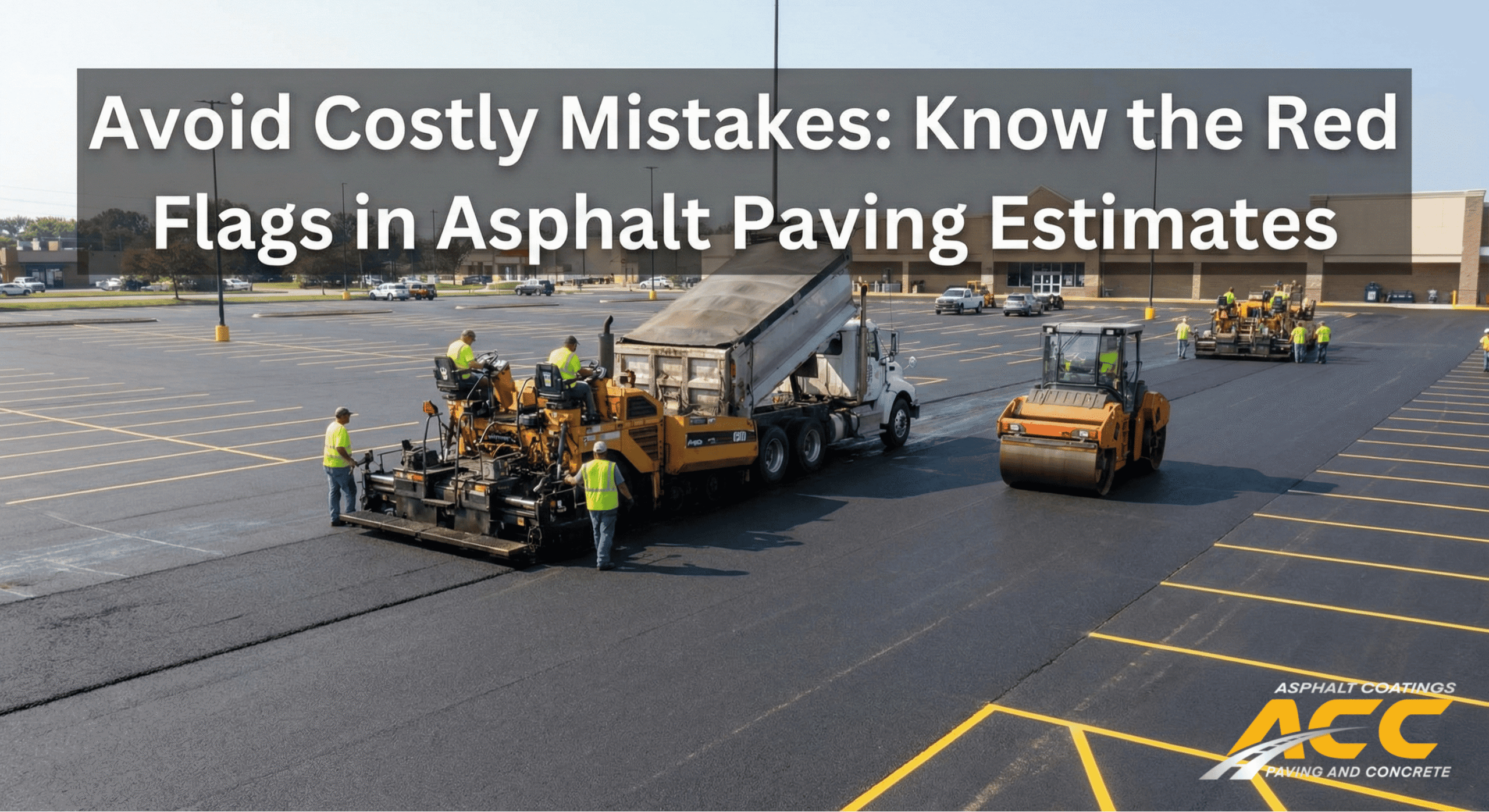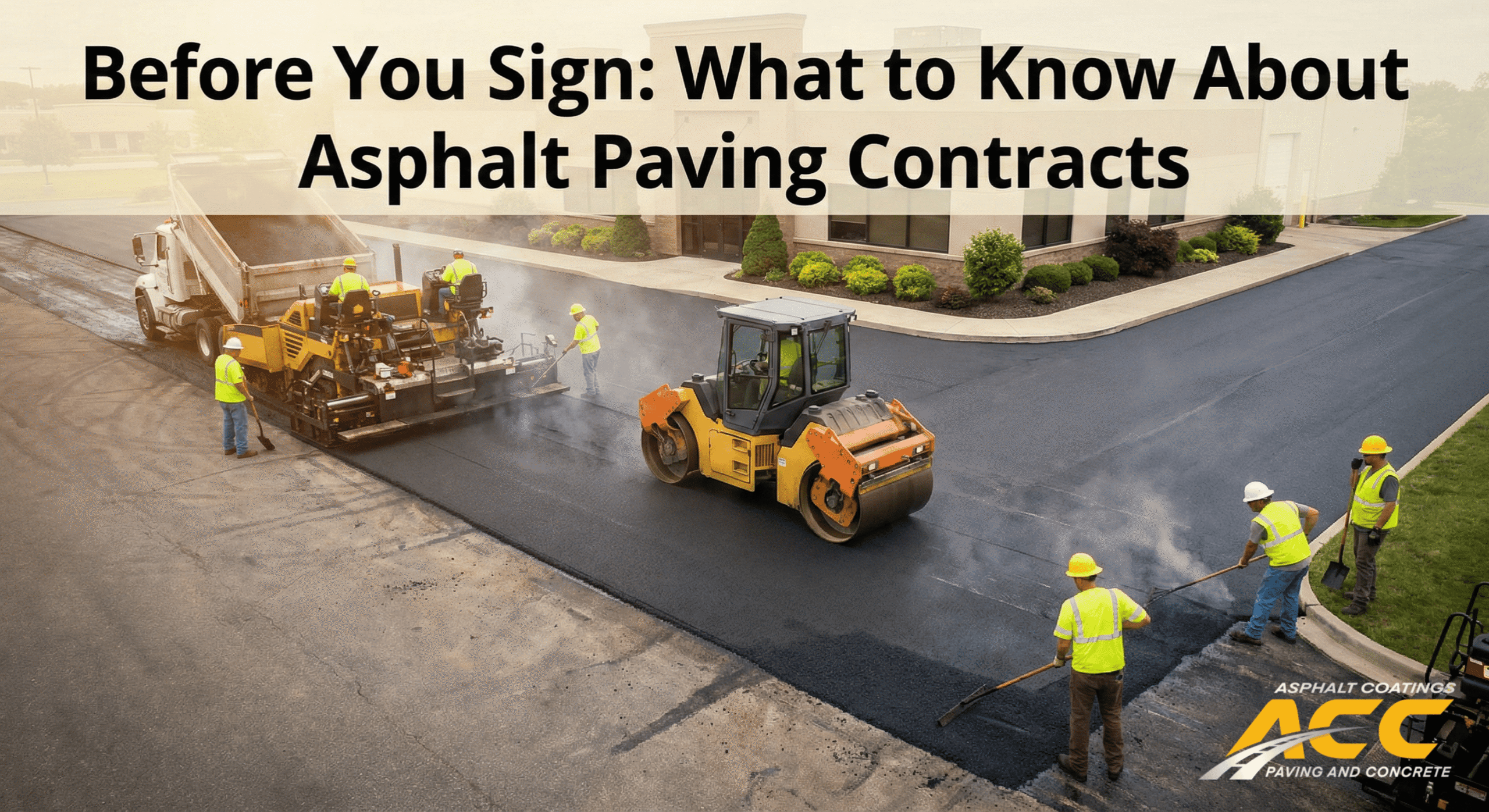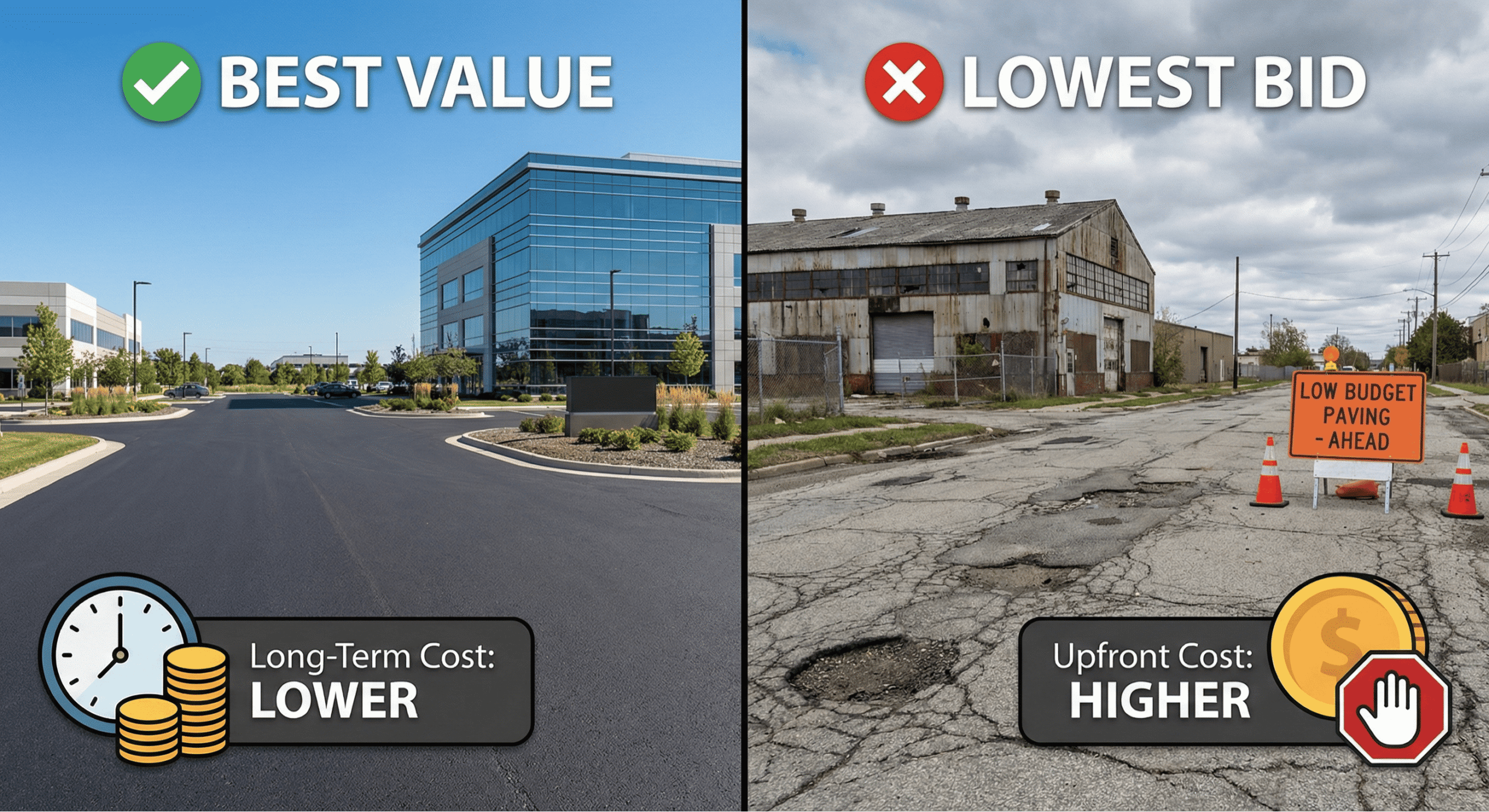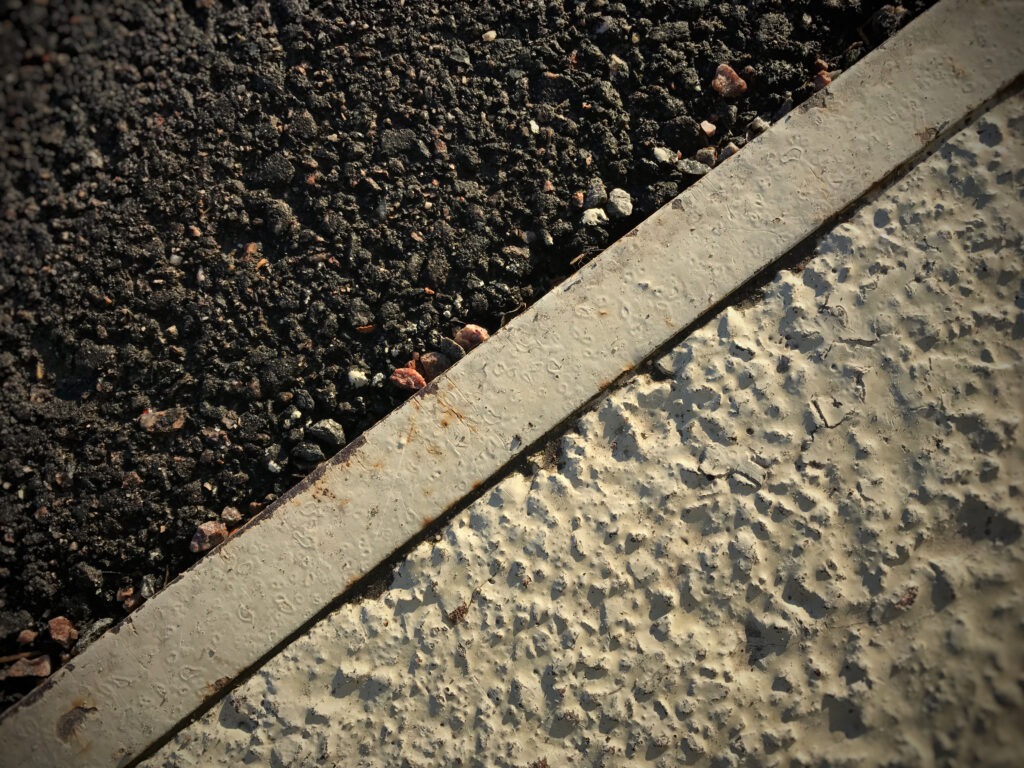
Parking lots in Colorado Springs face tough conditions year-round. From icy winters and frequent freeze-thaw cycles to hot summer days and heavy vehicle traffic, the surface you choose has a direct impact on durability, safety, and long-term costs. For property owners, business managers, and HOAs, the big question often comes down to one choice: asphalt or concrete.
According to the Colorado Department of Transportation, many paved surfaces last about 15 years, but with consistent preventative maintenance they can be extended to an average of 25 years before major reconstruction is needed.
Asphalt has the advantage of affordability, quick installation, and easier repairs, making it a popular pick for many commercial and residential lots. Concrete, on the other hand, is built for strength, long service life, and better load-bearing capacity, though it comes with a higher upfront price. Both materials can perform well in Colorado Springs, but their success depends on climate, maintenance, and usage.
Read this blog to see how asphalt and concrete parking lots perform in Colorado Springs, with comparisons on cost, durability, maintenance, and long-term value.
Why Choosing the Right Parking Lot Material Matters in Colorado Springs
If you own or manage property in Colorado Springs, the material you choose for your parking lot is more than just a construction decision. It directly affects how well your lot stands up to the city’s high-altitude climate, seasonal storms, and heavy use from both residents and visitors. Parking lot materials in Colorado Springs must be selected with local conditions in mind, because what works in a milder region may fail much sooner here.
Colorado Springs Weather and Traffic Challenges
At more than 6,000 feet above sea level, Colorado Springs experiences wide temperature swings, frequent freeze-thaw cycles, and intense sunlight. Snow and ice in winter lead to constant plowing and the use of deicing salts, both of which can weaken pavement if it is not designed properly. Summers bring strong UV exposure that accelerates surface wear, especially on asphalt.
Studies from the Federal Highway Administration show that areas with many freeze-thaw cycles experience significantly more joint spalling and cracking in concrete pavements over 15 years.
Traffic patterns also matter. Downtown businesses see a steady flow of passenger vehicles, while industrial areas handle delivery trucks and equipment that put additional stress on pavement. Choosing between asphalt and concrete in the Colorado climate requires balancing flexibility, strength, and resistance to weather extremes.
How Parking Lot Surfaces Impact Safety, Cost, and Appearance
The surface you select affects more than durability. A well-built asphalt or concrete lot improves drainage, reduces slip hazards in winter, and provides a smooth driving surface for visitors. Poor material choice or shortcuts during installation can lead to potholes, cracks, and uneven surfaces that not only raise repair costs but also create liability risks.
Appearance matters too. A dark asphalt lot can absorb heat and speed up snowmelt, while a light concrete surface reflects sunlight and gives a brighter, cleaner look. Both options have strengths, but in Colorado Springs the right choice depends on how you want to balance upfront cost, long-term maintenance, and the experience you want to provide for tenants, customers, or residents.
How Asphalt Parking Lots Perform in Colorado Springs
If you are considering asphalt for your parking lot in Colorado Springs, you are looking at one of the most practical options for this region. Asphalt has long been a popular choice for businesses, HOAs, and property owners because it is cost-effective, flexible, and relatively quick to install.
The local climate, however, plays a big role in how well it holds up. Between cold winters, heavy snowfall, and the freeze-thaw cycles that are common in El Paso County, asphalt’s performance is shaped by both its strengths and its maintenance needs.
Upfront Costs and Installation Timeline for Asphalt
One of the main reasons many property owners in Colorado Springs choose asphalt is affordability. On average, asphalt parking lots cost less per square foot to install compared to concrete. This makes it easier to invest in proper grading, base preparation, and drainage, which are critical for long-term performance in Colorado’s climate.
Installation is also faster. Asphalt lots can often be used within 24 to 48 hours of paving, which is a major advantage if your business cannot afford extended downtime.
How Asphalt Handles Freeze-Thaw Cycles and Snow Removal
Colorado Springs sits at a high elevation where temperatures fluctuate dramatically. Asphalt’s flexible nature allows it to expand and contract with temperature changes, which helps reduce cracking compared to more rigid surfaces. Another benefit is snow management.
Because asphalt is darker, it absorbs heat from the sun and helps snow and ice melt more quickly than concrete. That said, snowplows and deicing salts can still cause wear over time, so proper winter care is important.
Typical Lifespan of Asphalt Lots With Proper Maintenance
With the right care, an asphalt parking lot in Colorado Springs can last between 15 and 25 years. A study highlighted by the Colorado Asphalt Pavement Association reported that local agencies are responsible for maintaining about 72 percent of asphalt roads in Colorado, which shows how widely asphalt is trusted to handle the same conditions that parking lots face.
In Lakewood, the use of stone matrix asphalt (SMA) on busy arterial roads showed only minor rutting after nine years, with experts estimating it could last nearly twice as long as traditional overlays. These findings reflect how proper material choices and upkeep directly affect performance.
Common Maintenance Needs: Sealcoating, Crack Filling, Resurfacing
To maximize lifespan, asphalt paving in Colorado requires routine maintenance. Sealcoating every few years protects the surface from UV rays, moisture penetration, and chemical spills. Crack filling prevents small gaps from expanding during freeze-thaw cycles.
Over time, resurfacing may be necessary to restore smoothness and structural strength without fully replacing the lot. These services are relatively straightforward and more affordable than major concrete repairs, which is why many local property owners prefer asphalt.
What to Expect from Concrete Parking Lots in Colorado Springs
Concrete parking lots are a popular choice across Colorado Springs for their strength and long service life. While they come with a higher upfront investment than asphalt, many property owners appreciate the durability and reduced need for frequent resurfacing. If you are considering concrete paving in Colorado, here is what you can expect.
Concrete Installation Costs and Curing Time
Concrete parking lots typically cost more per square foot than asphalt because of the materials, reinforcement, and labor involved. In Colorado Springs, local pricing can vary based on soil conditions, excavation needs, and the required thickness for your lot. On average, installation costs range higher than asphalt but provide value over time through longer service life.
Concrete also requires more curing time. While asphalt lots can often be used within a couple of days, concrete lots usually need at least a week before they are ready for regular vehicle traffic. For large commercial lots, this curing period should be factored into planning to avoid disruptions.
Concrete’s Durability and Resistance to Heavy Loads
One of the strongest advantages of concrete paving in Colorado is its ability to withstand heavy traffic. Concrete is rigid and distributes loads across a wider area, which helps prevent rutting and deformation that can happen with asphalt under trucks or buses. For businesses with delivery fleets, warehouses, or frequent heavy equipment, concrete can often be the more practical long-term solution.
How Deicing Salts and Freeze-Thaw Affect Concrete
Colorado Springs winters bring snow, ice, and repeated freeze-thaw cycles. These conditions can stress concrete surfaces, especially if deicing salts are used heavily. A recent study found that after just 30 freeze-thaw cycles using a 5% sodium chloride solution, surface scaling of some concrete mixes increased by over 20 percent.
This illustrates how important it is to choose a high-quality concrete mix with proper air entrainment. Good drainage is also critical to reduce standing water that seeps into the surface and expands during freezing.
Routine Upkeep: Sealing Joints and Repairing Spalling
Although concrete parking lots last longer than asphalt, they are not maintenance-free. Property owners in Colorado Springs should plan to:
- Seal joints regularly to keep water and debris from entering and weakening the structure.
- Repair spalling or scaling early before it spreads and causes larger patches of damage.
- Inspect drainage to make sure melting snow and rain do not pool on the surface.
These maintenance steps are less frequent than asphalt resurfacing but are essential for keeping your concrete lot in top condition for decades.
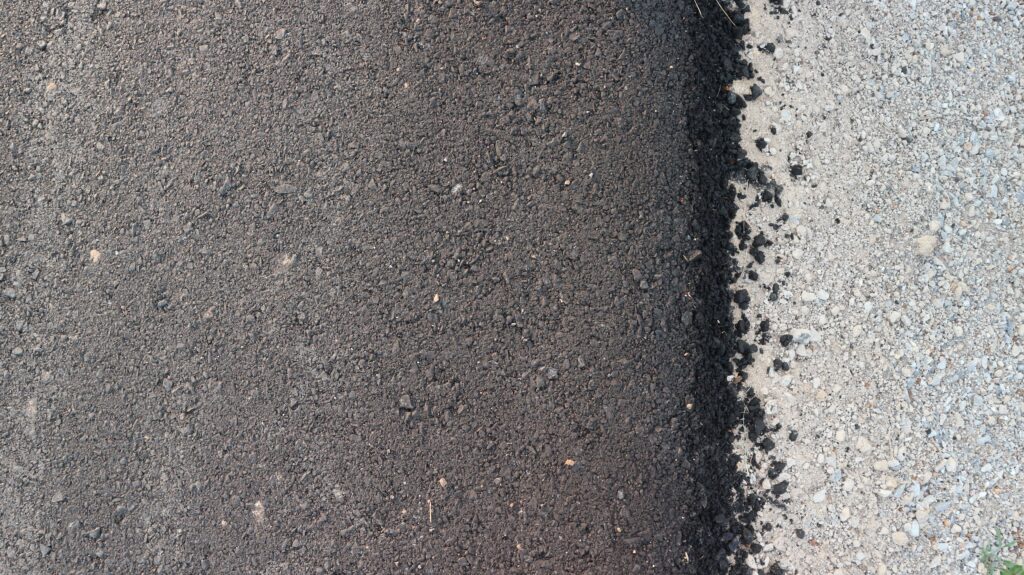
Comparing Asphalt and Concrete: Which Holds Up Better in Colorado Springs Climate?
If you live or manage property in Colorado Springs, you already know how unpredictable the weather can be. Parking lots here face a unique set of challenges that affect both asphalt and concrete surfaces. To make the right choice, it helps to understand how each material performs in the local climate.
Freeze-Thaw Cycles
Colorado Springs experiences frequent freeze-thaw cycles during the fall, winter, and early spring. Moisture seeps into small cracks in pavement, freezes, and expands, which leads to widening cracks and surface damage over time.
- Asphalt tends to handle these cycles better because it is more flexible. It can expand and contract without breaking apart as quickly.
- Concrete, on the other hand, is rigid. If not poured with proper air entrainment or installed with quality joints, it can crack and spall more easily under these conditions.
Snow and Ice Management
Snow removal is a regular part of winter here, and the material you choose can impact both safety and maintenance.
- Asphalt absorbs more heat from the sun, which helps snow and ice melt a bit faster. This can reduce the amount of time lots remain icy.
- Concrete stays cooler and often requires more deicing salt. However, salt can damage concrete over time, leading to scaling and surface deterioration.
High-Altitude Sun Exposure
At over 6,000 feet in elevation, Colorado Springs has strong UV exposure year-round.
- Asphalt is particularly vulnerable to UV rays, which dry out the binder and make the surface brittle unless it is sealcoated regularly.
- Concrete does not break down as quickly from UV exposure, though it can discolor and lose its bright appearance.
When it comes to climate performance, asphalt generally adapts better to freeze-thaw cycles, while concrete offers stronger resistance to sunlight but requires careful protection from salt damage. For Colorado Springs residents, the choice often comes down to whether you prioritize flexibility and ease of repair (asphalt) or strength and longer service life (concrete).
Which Option Lasts Longer in Colorado Springs: Asphalt or Concrete?
Deciding which surface will last longer comes down to design, the ground under the pavement, and how you care for the lot here in Colorado Springs. Below I break it down into the three key angles so you can make a clear choice for your property.
Average Lifespan With and Without Maintenance
Here are the typical lifespan ranges for each material in this region and how maintenance shifts those numbers.
- Asphalt: A well built asphalt parking lot in this region typically lasts about 15 to 25 years under normal conditions. With a disciplined maintenance plan of early crack sealing and regular sealcoating you can push that life toward the upper end of the range. If maintenance is ignored the surface will degrade much faster and may need full replacement in a decade or less.
- Concrete: Properly designed and constructed concrete pavements often reach 25 to 40 years or more. Long life depends on good mix design, adequate air entrainment to resist freeze and thaw cycles, correct jointing, and a stable base. When those details are skipped concrete life falls quickly due to scaling and joint failure.
Practical takeaway for you: asphalt can be a durable, lower cost choice if you plan and pay for regular preservation. Concrete gives longer service life when built to long life standards, but it must be done right from the start.
How Traffic Type (Cars vs. Trucks) Changes Longevity
Traffic type directly affects the pavement design and the realistic service life you should expect; read the key differences below.
- Light vehicle lots: If your parking lot is mainly used by passenger cars with the occasional delivery van, a properly built asphalt surface with routine upkeep often delivers the best value. According to studies on pavement types and performance, asphalt’s flexibility allows it to absorb small ground movements without leading to severe cracking.
- Heavy loads and frequent truck traffic: Concrete typically outperforms asphalt for yards that see constant heavy trucks, forklifts, or stacked loads. Concrete resists rutting and heavy axle loads better when the thickness and base are designed for that use.
What to ask your contractor: get the design traffic numbers in writing. That will determine pavement thickness, base design, and the realistic life you can expect.
Local Case Examples of Long-Lasting Lots
These local examples show how site work, materials, and maintenance combine to produce long service life in Colorado Springs.
- Retail and office centers: In Colorado Springs retail parking that receives good maintenance tends to see 18 to 25 years of useful life for asphalt. Regular sealcoat and timely crack repairs are common reasons these lots last.
- Municipal and heavy use lots: Sites built to rigid pavement standards with controlled joints and durable concrete mixes have been known to reach 40 years or longer when a geotechnical base design was used. For long life these projects follow published long life concrete guidelines.
- Poorly prepared sites: In areas with weak subgrade or bad drainage, both asphalt and concrete can fail early. In Colorado Springs the seasonal snowfall and frequent freeze and thaw cycles add stress, so a proper base and drainage design is often the deciding factor for long term performance. Check local climate normals when you plan your base and drainage (National Weather Service).
Final point for Colorado residents: the single biggest factor that changes expected life is the design of the base and drainage combined with a maintenance plan. If you want the surface to last, invest in a proper geotechnical assessment and a maintenance schedule tuned to local traffic and winter practices.
How Much Will You Spend Over Time? Asphalt vs. Concrete Cost Breakdown
When planning a parking lot in Colorado Springs, it is important to think beyond the initial price tag. Costs vary depending on soil conditions, traffic loads, and how well the surface is maintained in the local climate. Looking at installation, upkeep, and long-term expenses gives you a clearer picture of which option makes the most financial sense.
Initial Installation Cost Comparison
The first expense you will face is the installation itself, and the difference between asphalt and concrete is noticeable in Colorado Springs.
- Asphalt: On average, asphalt parking lots in Colorado Springs range from $4 to $7 per square foot, depending on the thickness of the base and asphalt layer. Asphalt is often chosen for commercial and residential lots because it provides more coverage for the budget. Installation is faster, which also helps reduce labor costs.
- Concrete: Concrete installation is more expensive upfront, usually $7 to $12 per square foot for standard parking lots. Decorative finishes or reinforced slabs can increase the price. Concrete also requires a longer curing time before vehicles can use the lot, which can add indirect costs if your business needs downtime.
Ongoing Maintenance Expenses
After installation, both materials come with ongoing upkeep, but the type and frequency of maintenance differ significantly.
- Asphalt: To keep asphalt in good shape in Colorado Springs, plan for sealcoating every 3 to 5 years and crack sealing as needed. These treatments protect the pavement from freeze-thaw cycles and water infiltration. Annual maintenance can average 15 to 25 cents per square foot, but neglecting it often leads to costly resurfacing.
- Concrete: Concrete does not need sealcoating, but joints must be sealed, and surface scaling from deicing salts may require patching. Maintenance costs are less frequent but repairs can be more expensive when issues develop. Expect to budget 10 to 20 cents per square foot annually for preventive care.
20–30 Year Life Cycle Cost Analysis
Finally, looking at costs over a 20 to 30 year span gives you the clearest idea of long-term value.
- Asphalt: With consistent maintenance, asphalt lots in Colorado Springs typically last 20 to 25 years. Over that time, the total investment can approach or exceed the initial cost of concrete once resealing, patching, and eventual resurfacing are factored in.
- Concrete: Concrete lots often last 30 years or more with fewer major repairs. Even though the upfront expense is higher, the reduced frequency of large-scale maintenance makes concrete more cost-effective for property owners who plan to hold their site long term.
Takeaway for Colorado Springs: If you are working within a tight budget or need a quick turnaround, asphalt is a solid choice. If you want a parking lot with lower long-term expenses and can afford the upfront investment, concrete may give you better value over the life of the pavement.
Which Looks Better: Asphalt or Concrete?
Colorado Springs property owners often weigh appearance as much as performance. Fresh asphalt delivers a smooth, black finish that creates strong curb appeal, especially for retail centers and office lots. Over time, it fades to gray, but regular sealcoating restores its dark, uniform look.
Concrete offers a brighter surface that reflects light and stays cleaner in Colorado’s dry, dusty climate. It can also be stamped, colored, or textured for decorative appeal, making it popular in residential communities and upscale businesses. The better-looking option depends on whether you prefer a sleek blacktop or a customizable, long-lasting finish.
When weighing asphalt and concrete for your Colorado Springs parking lot, consider the environmental impact. Local weather, altitude, and stormwater requirements all affect how these surfaces perform.
One factor to consider is the sustainability of asphalt. Asphalt is one of the most recycled materials in the U.S. in Colorado Springs, reclaimed asphalt is often reused in new projects. This reduces waste and lowers the energy required to produce fresh material, making it a practical, eco-friendly choice.
Concrete, on the other hand, has the advantage of high reflectivity. Because it is lighter in color than asphalt, it reflects more sunlight, keeping surfaces cooler in summer and helping reduce the urban heat island effect. This can also improve nighttime visibility for drivers and pedestrians.
Another key concern in this region is drainage and runoff. With Colorado Springs’ stormwater regulations, managing runoff is essential. Options like pervious concrete or permeable asphalt can improve water absorption, reduce strain on drainage systems, and support groundwater recharge.
Final Key Factors to Consider Before Making Your Decision
Choosing between asphalt and concrete in Colorado Springs goes beyond just cost. Local climate, traffic demands, and long-term maintenance all influence which option is the smarter investment for your property. Here are some of the most important factors to keep in mind:
- Budget Priorities: Asphalt usually comes with a lower upfront price, while concrete requires a bigger initial investment but may reduce major repair costs over time. Think about your short-term budget versus your long-term financial plan.
- Traffic Loads: A retail lot with light vehicle traffic may do well with asphalt, while logistics centers or heavy truck yards often benefit from concrete’s strength.
- Maintenance Commitment: Asphalt needs regular sealcoating and crack repairs, while concrete requires less frequent but sometimes more expensive fixes. Consider how much time and money you are willing to put into upkeep.
- Climate Resilience: Freeze-thaw cycles are tough on both materials. Asphalt’s flexibility helps it resist cracking, while concrete can stand up to heavy weight but may need protection against deicing salts.
- Soil and Drainage Conditions: Colorado Springs’ varying soil and strict stormwater management rules make proper base prep and drainage design essential, no matter which material you choose.
By weighing these factors carefully, you can decide which pavement type will deliver the best performance and value for your Colorado Springs parking lot.
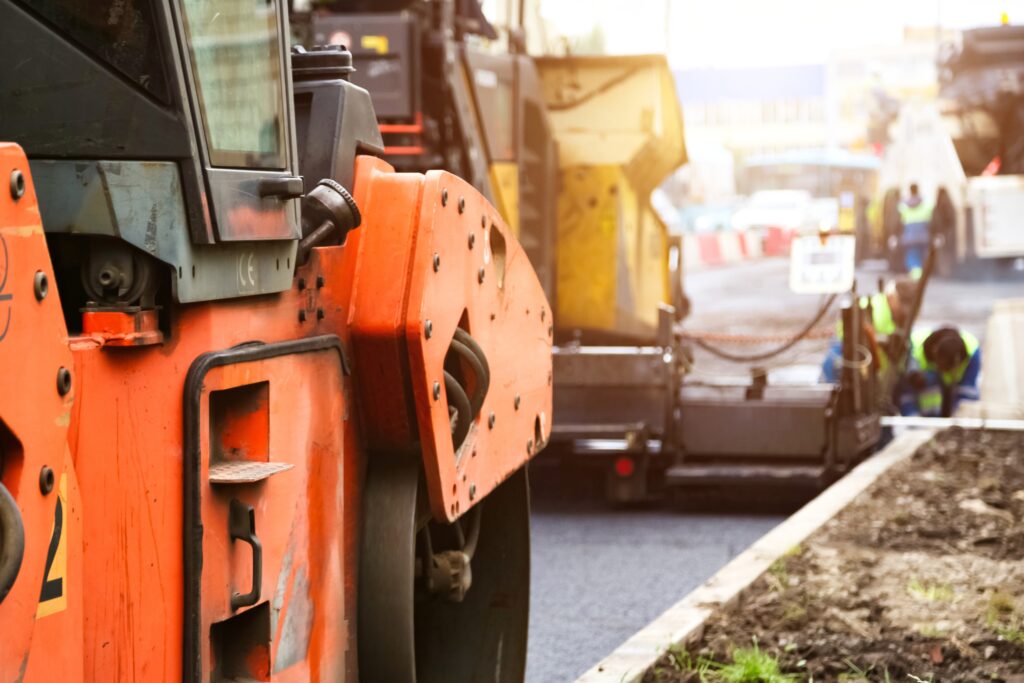
Make the Right Choice for Your Parking Lot with Asphalt Coatings Company
Both asphalt and concrete have clear advantages, but the best choice depends on your property’s needs, budget, and the kind of traffic your lot will handle. In Colorado Springs, where weather and soil conditions can be tough on pavement, it pays to work with a team that understands the local environment.
At Asphalt Coatings Company, we’ve been helping businesses, HOAs, and property managers throughout Colorado Springs build and maintain parking lots that last. From new installations to sealcoating, crack repair, and resurfacing, our crew knows how to get the job done right the first time.
If you’re weighing asphalt versus concrete and want expert guidance tailored to your property, we’re here to help. Contact us today for a free consultation and let’s create a parking lot that’s safe, durable, and cost-effective for years to come.
Frequently Asked Questions
How long do asphalt and concrete parking lots last in Colorado Springs?
Asphalt lots typically last 15 to 25 years in Colorado Springs, depending on upkeep. With regular sealcoating and crack repairs, they can reach the higher end of that range. Concrete lots often last 25 to 40 years when built with proper mix design, jointing, and maintenance.
Which is more cost-effective for Colorado Springs parking lots: asphalt or concrete?
Asphalt has a lower upfront cost, usually $4–$7 per square foot, and is faster to install. Concrete runs higher, around $7–$12 per square foot, but it requires fewer major repairs over time. For short-term budgets asphalt works best, while concrete may save more in long-term value.
How do freeze-thaw cycles affect asphalt and concrete surfaces?
Freeze-thaw cycles in Colorado Springs cause expansion and contraction that damage pavement. Asphalt’s flexibility helps it absorb these shifts with fewer cracks. Concrete is more rigid and, without proper air entrainment, is more prone to scaling, spalling, and joint damage.
Is asphalt or concrete better for heavy traffic in commercial parking lots?
Concrete generally performs better under heavy loads such as delivery trucks, forklifts, and frequent bus traffic. Asphalt can handle light to medium traffic well but may rut or deform under constant heavy axle loads. Businesses with fleets often benefit from concrete’s strength.
What maintenance is required for asphalt vs. concrete parking lots in Colorado Springs?
Asphalt needs sealcoating every 3–5 years and crack filling as needed to resist UV rays and freeze-thaw damage. Concrete requires joint sealing, drainage checks, and occasional repairs for scaling or spalling. Both benefit from routine inspections to prevent larger issues.

